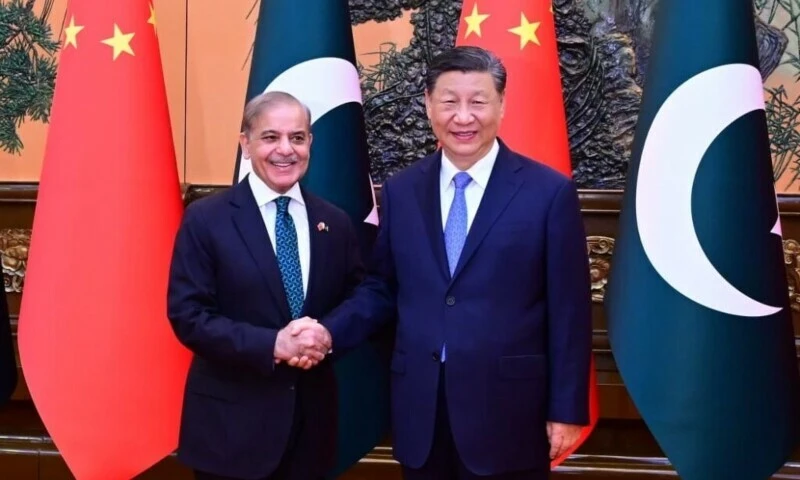Xi, Shehbaz and CPEC phase - 2

Stay tuned with 24 News HD Android App

Pakistani Premier Shehbaz Sharif has returned home after a very successful and comprehensive five-day official visit to the People's Republic of China from June 4 to 8 on the invitation of Chinese President Xi Jinping and Premier Li Qiang for wider talks aimed at upgradation and expansion of ties in various fields. He met top corporate executives of leading Chinese companies in the fuel, energy, and IT sectors besides addressing the Pakistan China Business Forum in Shenzhen. The two sides also undertook discussions to further strengthen the all-weather strategic cooperative partnership, upgrade the China-Pakistan Economic Corridor, advance trade and investment, enhance cooperation in security and defence, energy, space, science and technology, education, promote cultural cooperation and people to people contacts thus setting the future trajectory for Pakistan China friendship. Chinese visionary President Xi Jinping has already opened new economic avenues to excel.
Since its launch, CPEC, the game changer has been facing multiple challenges. The initiative is divided into three phases. The short-term phase (2015 - 2022), the medium-term phase (2021 - 2025), and the long-term phase (2026 - 2030). The official launch of China Pakistan Economic Corridor took place on April 20, 2015, when the then Pakistani Prime Minister Nawaz Sharif and Chinese President Xi Jinping signed 51 agreements and Memorandums of Understanding with a combined value of US $ 46 billion.
The second phase of the Pakistan Economic Corridor is aligned to very objectives. To accelerate industrialization, it was decided to set up special economic zones (SEZs) in each province of Pakistan. The first of these, Allama Iqbal Industrial City (AIIC) became operational in Faisalabad in early 2020. Pakistan and China have intensified efforts to establish a working group on five new economic corridors under the second phase of the China-Pakistan Economic Corridor (CPEC), aligning with the 5Es framework.
Both Pakistan and China have agreed to expedite the second phase of CPEC and establish a working group on five new economic corridors, including the corridor of job creation, corridor of innovation, corridor of green energy, and corridor of Inclusive regional development. Pakistan has already initiated the implementation of the 5Es framework, which includes Export, Energy, Equity, E-Pakistan, and Environment. This framework will align with the five new economic corridors to advance the region’s prosperity in each sector under the vision of Chinese President Xi Jinping who because of his commitment and tiresome work is widely known.
The “One Plus Four” model is proposed, wherein each SEZ in Pakistan would be partnered with one province from China, one industry group to develop specialised clusters within the SEZs, one SEZ from China to provide technical expertise, and a state-owned enterprise to spearhead SEZ in Pakistan. A collaborative framework would expedite the establishment and growth of SEZs, enhancing their competitiveness and attractiveness to investors. The success of SEZs depends upon their ability to become clusters of specific industries, fostering economies of scale, and creating a vibrant ecosystem conducive to innovation and growth. Under China Pakistan Economic Corridor the Gwadar Port and the M-8 motorway, will strengthen trade links and facilitate regional integration.
It is encouraging that both China and Pakistan have paid due priority and attention to making Xi Shehbaz meetings tangible and result-oriented. Before leaving for China Premier Shehbaz Sharif convened a comprehensive preparatory meeting where he issued several directives to different ministers and departments to create strategies aimed at attracting Chinese industries to establish their operations in Pakistan, assuring them of the government's complete support and facilitation.
Premier Shehbaz Sharif's visit to China assumed special significance as it took place at a time when the federal government was about to present the budget for the next financial year and the date of its presentation was delayed because of the Premier's visit which means it has very close linkage with the budgetary plans of the country. China has been a reliable source for external inflows and there are also expectations from the people of Pakistan that the friendly country China would continue to help accelerate the pace of socio-economic progress through China Pakistan Economic Corridor.
Ahead of the visit, the government of Pakistan has approved the construction of the 241 km long Thakot - Raikot section of the Karakorum Highway under the China-Pakistan Economic Corridor at the cost of US $ 2 billion. This project has special importance because of its potential to give a boost to economic and commercial relations between the two countries but more important is the need to launch and implement the second phase of the Pakistan Economic Corridor which has the prospects to help overcome Pakistan's economic worries.
Prime Minister's recent visit to China along with a high-level business delegation will open new avenues of prosperity and development. The industrial revolution with the close cooperation of China will change the course of the region. This is a take-off position. The corridor is on the verge of boom. At this stage firstly Pakistan will have to focus on an uninterrupted supply of energy to the entire industrial zones in the country. Secondly, the government of Pakistan will have to make the law and order situation foolproof by all means. To safeguard foreign investment and Chinese officials Pakistan will have to crush terrorists across the board. A conducive environment and sound law and order conditions are always helpful for investment and industrialization in the region.
